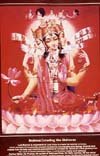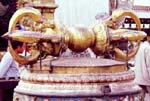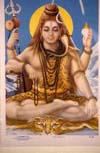


be re-born in the future.


Glossary
 |
Aum—Also written as Om. Ancient Hindu chant symbolizing the four stages of consciousness: 1. A=waking; 2. U=dreaming; 3. M=dreamless sleep; 4. the silence between each repetition. |
 |
Brahma—Hindu god known as the Creator. One of three primary gods. |
| Demi-gods—Beings with great power, but not as much power as the gods. | |
 |
Dorje Gyatram—Double-headed scepter, signifying the hub of the world. It is the Tibetan Buddhist form of the ancient Hindu Vajre, or thunderbolt, representing indestructible truth.There are connections with the thunderbolt of the Norse god Thor. |
| Gyatso—The original ocean, in Buddhist and Hindu belief, that produced all life. The Sanskrit name for this ocean is Sagara. | |
| Jataka Tales—A collection of 547 stories, somewhat like fables, illustrating various lessons in Buddhist behavior and belief. | |
| Karma—The belief that everything we do in body, speech and mind affects our future, whether in this lifetime or another. | |
| Meditation—Thinking deeply about an important idea, usually while sitting relaxed and still. | |
| Nirvana—Freedom from the cycle of rebirth. | |
| Prophet--Someone who claims to speak of the future by divine inspiration. | |
| Reincarnation—The idea that each of us lives for many lifetimes, and that we will be re-born in the future. |
|
| Rirap Lhunpo--The sacred mountain at the center of the universe. In Sanskrit, it is Sumeru, or Mount Meru. | |
| Samsara—The world of rebirth and death | |
| Sanskrit—The ancient language of India. | |
| Scepter—A staff carried by a ruler or important religious person, usually in ceremonies. It symbolizes authority. | |
 |
Shiva—Hindu god known as the Destroyer. One of three primary gods. |
 |
Vishnu—Hindu god who maintains the cosmos. One of three primary gods. |